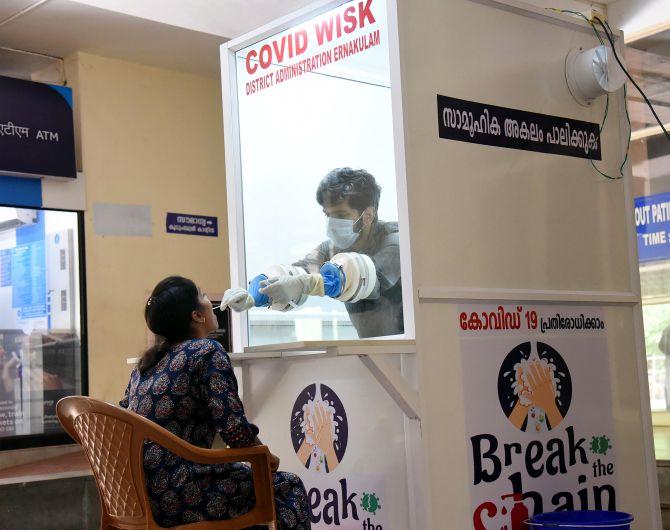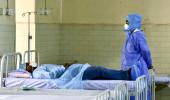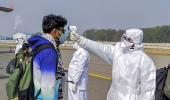Union Science and Technology Minister Harsh Vardhan on Friday said Kerala-based Sree Chitra Tirunal Institute for Medical Science and Technology has developed a low cost diagnostic test kit that can confirm in two hours the presence of COVID-19 infection.

The diagnostic test kit developed by the Thiruvananthapuram institute can detect coronavirus in 10 minutes, and the sample to result time will be less than two hours, Vardhan tweeted.
A total of 30 samples can be tested in a single batch on a single machine, he said.
'The confirmatory diagnostic test, which detects the N Gene of #SARS_COV_2 using reverse transcriptase loop-mediated amplification of viral nucleic acid, will be one of the world's first few, if not the first of its kind in the world,' Vardhan tweeted.
The diagnostic kit comes at a time when India is looking to ramp up its testing for the contagious virus and has been procuring kits from outside the country.
The Department of Science and Technology said the new diagnostic kit is cost-effective as each test will cost the lab Rs 1,000, which is less than the minimum cost of COVID-19 tests being carried out at present.
Known for its low-cost innovations like developing indigenous heart valves in the past, the Sree Chitra Tirunal Institute for Medical Sciences and Technology is an Institute of National Importance under the Department of Science and Technology (S&T).
It has been at the forefront in developing medical aids in fighting coronavirus.
The test kit called Chitra GeneLAMP-N, funded by the Department of S&T, is highly specific for SARS-CoV-2 N-gene and can detect two regions of the gene, which will ensure that the test does not fail even if one region of the viral gene undergoes mutation during its current spread.
The Department of S&T said the tests performed at National Institute of Virology, Alappuzha show that Chitra GeneLAMP-N has 100 per cent accuracy and match with test results using RT-PCR.
This has been intimated to the Indian Council for Medical Research, the authority to approve it, for COVID-19 testing in India, it said.
Current PCR kits in India enable detection of E gene for screening and RdRp (RNA-dependent RNA polymerase) gene for confirmation.
Chitra GeneLAMP-N gene testing will allow confirmation in one test without the need for a screening test and at much lower costs, the department said.
"Development of a novel, inexpensive, rapid confirmatory for the diagnosis of COVID1-9 by Sree Chitra in record time is a compelling example of how a creative team of clinicians and scientists working together seamlessly can leverage knowledge and infrastructure to make relevant breakthroughs," said Prof Ashutosh Sharma, Secretary, Department of S&T.
The testing facility can be easily set up even in the laboratories of district hospitals with limited facilities and trained laboratory technicians and the results can be read from the machine from the change in fluorescence, he added.
The cost of testing with the new device for LAMP testing and the test kit for two regions of N gene (including RNA extraction) will be less than Rs 1,000 per test for the laboratory.
The technology was transferred for manufacture to M/S Agappe Diagnostics Ltd, Ernakulam, a leading company in in-vitro diagnostics with national and international operations.
Besides the diagnostic test kit, the institute has also developed Acrylosorb, an equipment to collect body fluids and dispose them off safely, which is the first such equipment developed.
AcryloSorb can absorb liquids at least 20 times more than its dry weight and also contains a decontaminant for in situ disinfection.
The superabsorbent material can be effective in the safe management of infected respiratory secretions
Another innovation is an isolation pod that restricts COVID-19 patients from having contact with others. The isolation pod is a chamber, just like a telephone booth, for examining COVID-19 patients.
The disinfected examination booth is closed like a telephone booth for examining the patient without direct contact with the doctor to prevent transmission of infection. It is equipped with a lamp, table fan, rack, and Ultraviolet (UV) light.
The installed UV light in the booth disinfects the chamber after each patient leaves.
A pair of gloves provided in the examination booth allows the patient's physical examination. Additionally, an entry tunnel on the side frame is provided to pass a stethoscope within the chamber.
The institute has also developed a bubble helmet, an alternative option for the traditional oxygen masks.











 © 2025
© 2025